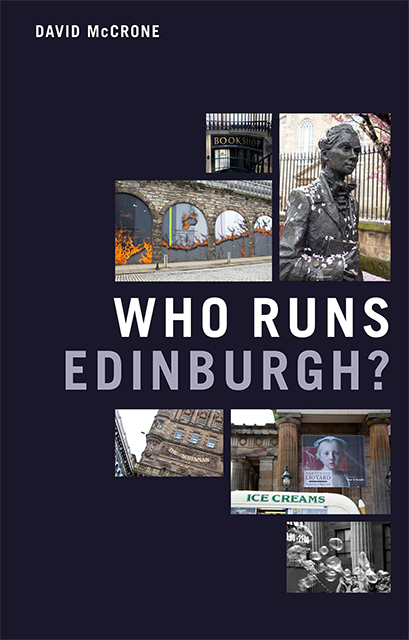Book contents
- Frontmatter
- List of Contents
- Figures and Tables
- Preface
- 1 Who Runs Edinburgh?
- 2 Politics in Edinburgh
- 3 Winners and Losers: The Political Economy of Edinburgh
- 4 Treading Angels: Edinburgh and its Festivals
- 5 Are You One of Us? Status in the City
- 6 What School did You Go To? Education and Status in Edinburgh
- 7 Enlightened City: Cultural Power and University Life
- 8 Developing Edinburgh: Pies in the Sky, Holes in the Ground
- 9 Lost in Leith: Accounting for Edinburgh’s Trams
- 10 Does Anyone Really Run Edinburgh?
- Bibliography
- Index
3 - Winners and Losers: The Political Economy of Edinburgh
Published online by Cambridge University Press: 25 October 2023
- Frontmatter
- List of Contents
- Figures and Tables
- Preface
- 1 Who Runs Edinburgh?
- 2 Politics in Edinburgh
- 3 Winners and Losers: The Political Economy of Edinburgh
- 4 Treading Angels: Edinburgh and its Festivals
- 5 Are You One of Us? Status in the City
- 6 What School did You Go To? Education and Status in Edinburgh
- 7 Enlightened City: Cultural Power and University Life
- 8 Developing Edinburgh: Pies in the Sky, Holes in the Ground
- 9 Lost in Leith: Accounting for Edinburgh’s Trams
- 10 Does Anyone Really Run Edinburgh?
- Bibliography
- Index
Summary
Lying behind the changing fortunes in politics in Edinburgh is its changing economy. It is, however, not a question of reading one off the other, assuming that ‘politics’ is simply the expression of the ‘economy’. Furthermore, we have grown so used to defining Edinburgh as a city of professions, money and culture that we tend to assume that this has always been so. Our examination of the city's politics indicates otherwise. Small, local, capital had expression in its ‘non-political’ politics for such a long time, occupying most of the twentieth century, and thus shaping what came after it.
In 1914, the Merchant Company of Edinburgh proclaimed its local patriotism:
The Company is not merely a company of merchants. It is the Company of Merchants of the City of Edinburgh and nothing that concerns Edinburgh or the district included in the definition should be a matter of indifference to it. In everything that concerns the welfare of this district as a whole the Company has a direct responsibility.
This begged many questions which the Merchant Company was aware of. It was no longer
a compact association of members with identical and limited interests, but includes merchants, bankers, traders, principals or agents engaged in any department of commerce, trade, manufacture or handicraft, architects, engineers or surveyors, managing directors, managers and principal officers of banks, insurances or other companies.
The Company, in other words, now represented ‘many various and sometimes antagonistic interests’.
EDINBURGH CASTES
It had tended to be ever thus. John Heiton's Castes of Edinburgh, fifty years previously, had made that plain:
The Merchants –not great with us –stand between the Professionals and the Shopkeepers; these are getting up; the Big Panes despise the Little Panes. The latter expel the Tradesmen, who erect a nez troussé against the Labourers. And these lord it over the Irish Fish-dealers, who will cut an Applewoman of a Sunday. (Heiton 1861: 6–7)
Robbie Gray's study of the labour aristocracy in Victorian Edinburgh showed how status differences –caste distinctions –ran all the way down Edinburgh's class system, but that ‘the city's notorious snobbery seems to have derived from social and political rivalries encouraged by this heterogeneity of the wealthier classes’ (Gray 1976: 20). It is not difficult to characterise Edinburgh as a city of class distinctions –‘ snobbery’ –but these social distinctions were not bi-modal, but subtle and multi-varied.
- Type
- Chapter
- Information
- Who Runs Edinburgh? , pp. 51 - 80Publisher: Edinburgh University PressPrint publication year: 2022



